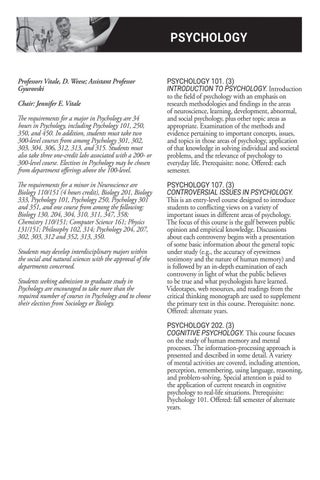physics and astronomy
115
PSYCHOLOGY
Professors Vitale, D. Weese; Assistant Professor Gyurovski Chair: Jennifer E. Vitale The requirements for a major in Psychology are 34 hours in Psychology, including Psychology 101, 250, 350, and 450. In addition, students must take two 300-level courses from among Psychology 301, 302, 303, 304, 306, 312, 313, and 315. Students must also take three one-credit labs associated with a 200- or 300-level course. Electives in Psychology may be chosen from department offerings above the 100-level. The requirements for a minor in Neuroscience are Biology 110/151 (4 hours credit), Biology 201, Biology 333, Psychology 101, Psychology 250, Psychology 301 and 351, and one course from among the following: Biology 130, 204, 304, 310, 311, 347, 358; Chemistry 110/151; Computer Science 161; Physics 131/151; Philosophy 102, 314; Psychology 204, 207, 302, 303, 312 and 352, 313, 350. Students may develop interdisciplinary majors within the social and natural sciences with the approval of the departments concerned. Students seeking admission to graduate study in Psychology are encouraged to take more than the required number of courses in Psychology and to choose their electives from Sociology or Biology.
PSYCHOLOGY 101. (3) INTRODUCTION TO PSYCHOLOGY. Introduction to the field of psychology with an emphasis on research methodologies and findings in the areas of neuroscience, learning, development, abnormal, and social psychology, plus other topic areas as appropriate. Examination of the methods and evidence pertaining to important concepts, issues, and topics in those areas of psychology, application of that knowledge in solving individual and societal problems, and the relevance of psychology to everyday life. Prerequisite: none. Offered: each semester. PSYCHOLOGY 107. (3) CONTROVERSIAL ISSUES IN PSYCHOLOGY. This is an entry-level course designed to introduce students to conflicting views on a variety of important issues in different areas of psychology. The focus of this course is the gulf between public opinion and empirical knowledge. Discussions about each controversy begins with a presentation of some basic information about the general topic under study (e.g., the accuracy of eyewitness testimony and the nature of human memory) and is followed by an in-depth examination of each controversy in light of what the public believes to be true and what psychologists have learned. Videotapes, web resources, and readings from the critical thinking monograph are used to supplement the primary text in this course. Prerequisite: none. Offered: alternate years. PSYCHOLOGY 202. (3) COGNITIVE PSYCHOLOGY. This course focuses on the study of human memory and mental processes. The information-processing approach is presented and described in some detail. A variety of mental activities are covered, including attention, perception, remembering, using language, reasoning, and problem-solving. Special attention is paid to the application of current research in cognitive psychology to real-life situations. Prerequisite: Psychology 101. Offered: fall semester of alternate years.





















